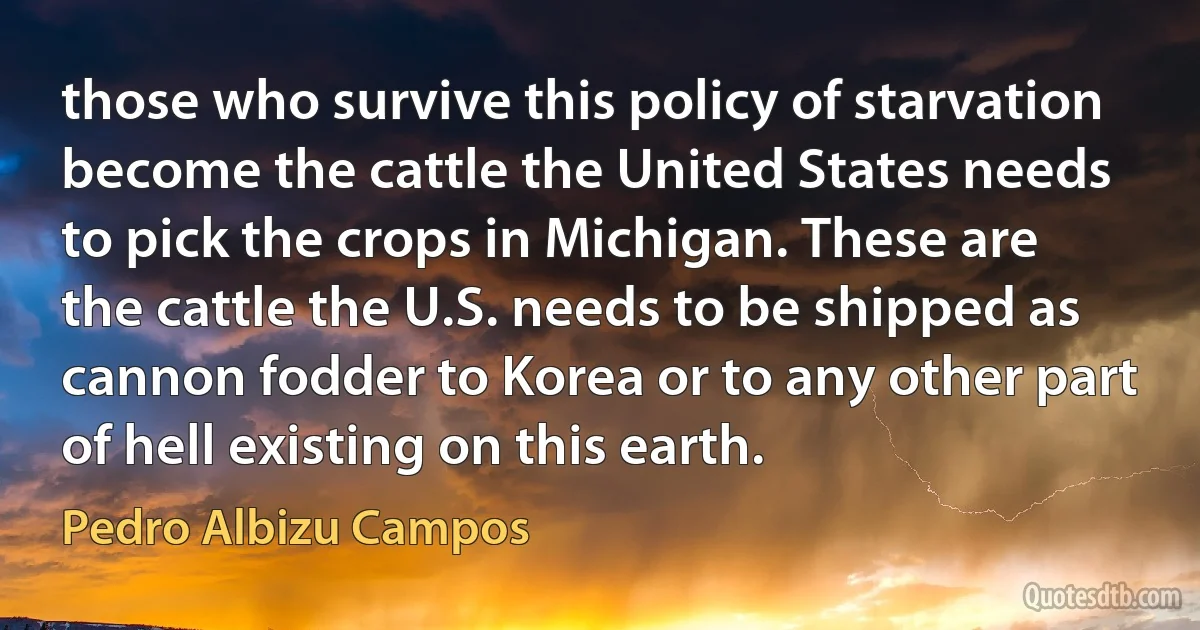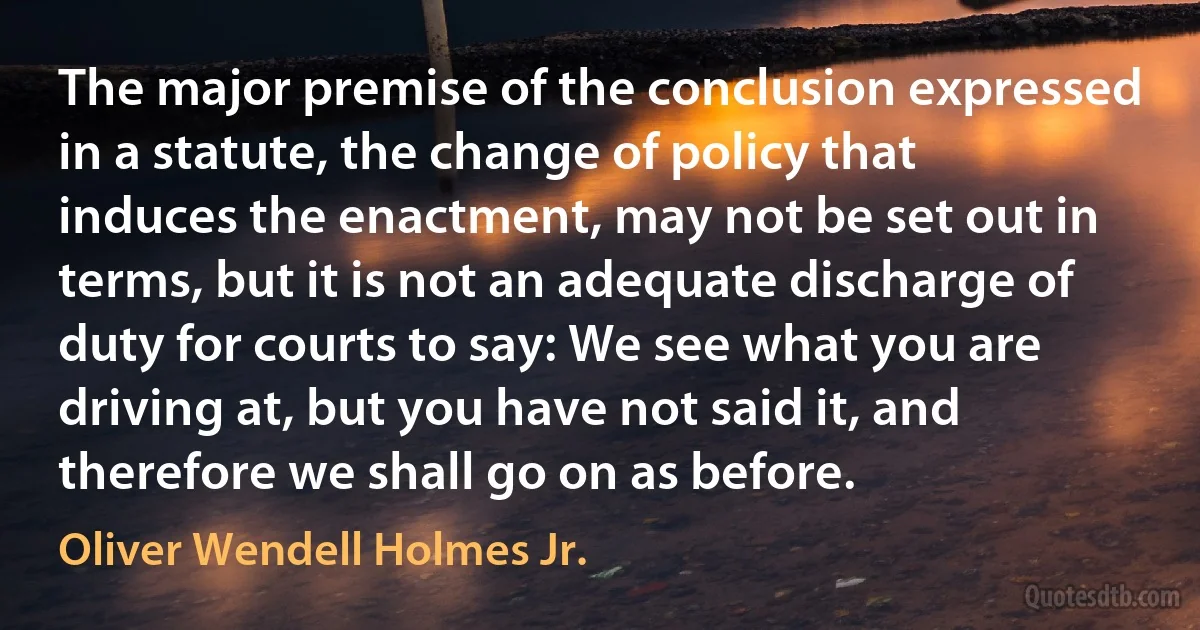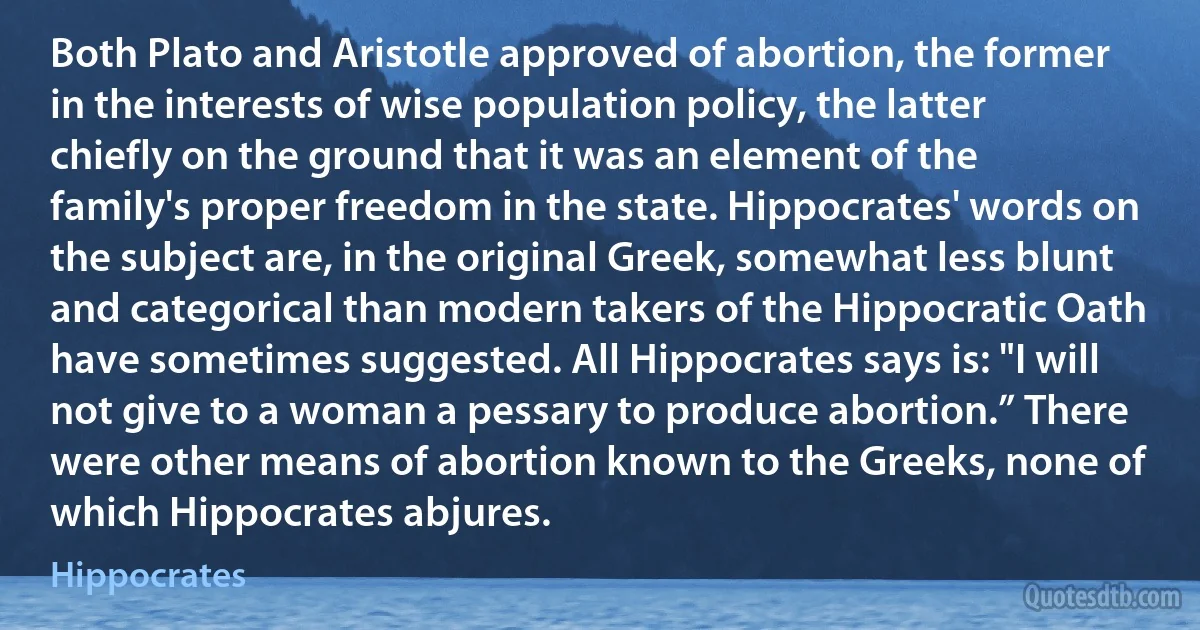Policy Quotes - page 90
if the United States feels obligated to intervene in Korea with all their weapons, let them mobilize themselves. Let them go fight for their interests, instead of taking advantage of Puerto Rico's defenselessness to make it go to defend the sordidness and the iniquity of their policy before the world, that is shamelessness.

Pedro Albizu Campos
there's no money to bring a loaf of bread to Lares, but for a jail in Lares there will be money. So, lots of money for jails in Lares and all Puerto Rico-for schools, yes, because they are to destroy the heart and mind of the Puerto Rican, denaturalize him, prostitute him, corrupt him for that there will be money. There's money to have the Health Department in Puerto Rico inject the youth of Puerto Rico with any disease that the U.S. government desires, to kill them on a long-term basis, there's yes, money for that but to kill hunger in Lares, Jayuya, Utuado, in Comerío, in the whole nation there's not a penny because hunger is the policy of the United States. The yanqui believes that when a human being is deprived of his loaf of bread, he will surrender and humiliate himself to be kicked by anyone. He will turn in his mother, his wife, his own dignity, so as not to suffer hunger. That's the policy of the United States.

Pedro Albizu Campos
That is, by arming the negro we have added a powerful ally. They will make good soldiers and taking them from the enemy weaken him in the same proportion they strengthen us. I am therefore most decidedly in favor of pushing this policy to the enlistment of a force sufficient to hold all the South falling into our hands and to aid in capturing more.

Ulysses S. Grant
In regard to foreign policy, I would deal with nations as equitable law requires individuals to deal with each other, and I would protect the law-abiding citizen, whether of native or foreign birth, wherever his rights are jeopardized or the flag of our country floats. I would respect the rights of all nations, demanding equal respect for our own. If others depart from this rule in their dealings with us, we may be compelled to follow their precedent.

Ulysses S. Grant
In the Senate yesterday, Minority Leader Mitch McConnell accused Democrats of breaking their promise to confirm a number of presidential judicial nominations. To punish the Dems, McConnell used Senate rules to waste virtually the whole day having the Senate clerk read the bill under consideration, a global warming bill, aloud -- all 491 pages of it. Why? A Republican lobbyist leaked an internal GOP strategy memo to the Democrats (quote): "The GOP very much wants to have this fight, engage in it for a prolonged period, and then make it as difficult as possible to move off the bill." Why? (quote) "The focus is much more on making political points than in amending the bill, changing the baseline text for any future debate, or effecting policy." Making not policy but political points the goal of Mr. Bush's party: and you thought they weren't good at anything.

Mitch McConnell
Spinoza's views on God, religion and society have lost none of their relevance. At a time when Americans seem willing to bargain away their freedoms for security, when politicians talk of banning people of a certain faith from our shores, and when religious zealotry exercises greater influence on matters of law and public policy, Spinoza's philosophy – especially his defence of democracy, liberty, secularity and toleration – has never been more timely. In his distress over the deteriorating political situation in the Dutch Republic, and despite the personal danger he faced, Spinoza did not hesitate to boldly defend the radical Enlightenment values that he, along with many of his compatriots, held dear. In Spinoza we can find inspiration for resistance to oppressive authority and a role model for intellectual opposition to those who, through the encouragement of irrational beliefs and the maintenance of ignorance, try to get citizens to act contrary to their own best interests.

Baruch Spinoza
The cunning of Julian Assange's strategy is that he has made everyone complicit in his own private decision to try to sabotage U.S. foreign policy. Unless you consider yourself bound by the hysterically stupid decision of the Obama administration to forbid all federal employees from downloading or viewing the WikiLeaks papers, you will at the very least have indulged in a certain amount of guilty pleasure.

Julian Assange
What right-wing people in this country would love is an open-border policy. Bring in all kinds of people, work for $2 or $3 an hour, that would be great for them. I don't believe in that. I think we have to raise wages in this country, I think we have to do everything we can to create millions of jobs.
You know what youth unemployment is in the United States of America today? If you're a white high school graduate, it's 33 percent, Hispanic 36 percent, African American 51 percent. You think we should open the borders and bring in a lot of low-wage workers, or do you think maybe we should try to get jobs for those kids?
I think from a moral responsibility we've got to work with the rest of the industrialized world to address the problems of international poverty, but you don't do that by making people in this country even poorer.

Bernie Sanders
Nowhere does one read.. a condemnation of the five-year torture and pursuit of [alternative media] journalist and Wikileaks founder Julian Assange, who has been holed up in the London embassy of Ecuador... His real crime, and the thing the US wants... him...for, is publishing leaked Pentagon documents and videotapes proving a policy in the Iraq war of massive and deliberate war crimes...Because a press freedom is under serious attack these days, certainly by President Trump, but also by a corporate media itself that supports a censored internet and a two-tiered access to high-speed internet - both of which measures threaten alternative news media - and that fail to firmly support and defend the whistleblowers who often are critically important in bringing urgent stories of government and corporate wrongdoing to light.

Julian Assange
I have read half your book thro' and I am immensely charmed by it. But some things I disagree with and more I do not understand. This does not apply to the characters, but to your conclusions, e.g. you say "women are more sympathetic than men." Now if I were to write a book out of my experience I should begin Women have no sympathy. Yours is the tradition. Mine is the conviction of experience. I have never found one woman who has altered her life by one iota for me or my opinions. Now look at my experience of men. A statesman, past middle age, absorbed in politics for a quarter of a century, out of sympathy with me, remodels his whole life and policy - learns a science the driest, the most technical, the most difficult, that of administration, as far as it concerns the lives of men, - not, as I learnt it, in the field from stirring experience, but by writing dry regulations in a London room by my sofa with me. This is what I call real sympathy.

Florence Nightingale
The government now tried coercion and vigorous campaign reduced a portion of them [the Navajos] to apparent submission. Again a treaty was made... Another and several other expeditions were organized, all ending and being followed with like results, not because the troops did not bravely energetically and intelligently carry out their instructions; but because the policy adopted was erroneous.
The last and perhaps most successful expedition sent against them under this policy, was that of 1860-61 under command of Bvt. Col. (now Brig, Gen.) E.R.S. Canby, U.S. Army. The treaty made on this occasion was signed by twenty-two Chiefs, a greater number than on any other previous occasion. From this fact and other concurrent causes, it was believed that permanent peace and security was at last bestowed on the Territory, and commensurate to the boon was the joy of the people.

Kit Carson
The unnatural union between church and state which has degraded religion into an engine of policy will be dissolved. Tythes, the pest of agriculture, will be abolished, the memory of religious dissensions will be lost when no sect shall have an exclusive right to govern their fellow citizens. Each sect will maintain its own clergy, and no citizen will be disfranchised for worshipping God according to his conscience. To say all in one word, Ireland shall be independent. We shall be a nation, not a province; citizens, not slaves. Every man shall rank in the state according to his merit and his talents.

Theobald Wolfe Tone
If such men lose, in the issue, their property, they are themselves alone to blame. By deserting the first and most sacred of duties, the duty to their country, they have incurred a wilful forfeiture; by disdaining to occupy the station they might have held among the people and which the people would have been glad to see them fill, they left a vacancy to be seized by those who had more courage, more sense and more honesty; and not only so, but by this base and interested desertion they furnished their enemies with every argument of justice, policy and interest to enforce the system of confiscation... The best that can be said in palliation of the conduct of the English party is that they are content to sacrifice the liberty and independence of their country to the pleasure of revenge and their own personal security. They see Ireland only in their rent rolls, their places, their patronage and their pensions.

Theobald Wolfe Tone
Well, I want him to answer the following question: Where in my speech was there any reference to anything that would jeopardise the rights of Albanians? So I'm quoting this to him. "In this area there should be a policy of national equality of rights, a spirit of tolerance should prevail. Everything that characterises a humane, democratic society.”.

Slobodan Milošević
Aurangzeb's orthodoxy cannot, of course, be entirely denied. Therefore, explanations upon explanations – secular explanations! – are invented...The general conclusion: what Aurangzeb did ‘was a setback to the policy of broad toleration followed by his predecessors'! And even he did it for secular reasons! And even though compelled by these reasons, he did it only for the shortest time, for the years marked by hostilities instigated by ‘local elements'! ... However, there is little mystery. For there are two pillars of progressive history writing in India: first, to fabricate evidence which will establish Hindus to be intolerant; second, to respect and show an empathetic understanding of Islamic communalism. And the litmus test of whether you are committed to secular history writing is whether you are prepared to stand up for Aurangzeb!

Aurangzeb
So it is that I can talk for an hour on North Korean race propaganda, only to be chided during the question-and-answer session for overlooking the "nationalism" inherent in Stalin's "Socialism in One Country" policy. This is a prime example of the terminological confusion discussed above. Putting one's multiethnic state first is not the same as propagating a race theory.

Brian Reynolds Myers
It was several minutes. They had a very good conversation. I think he, like a lot of people, feels that the kinds of personal attacks that she's -- that have been directed her way are inappropriate. The fact that our political discourse has become debased in many ways is bad enough. It is worse when it's directed at private citizen who was simply expressing her views on a matter of public policy.

Sandra Fluke
My approach to the job can be summed up pretty simply - I never viewed politics as my career. Important, yes, worthy of intense commitment, of course - but it was not my whole life. ... I saw politics as a way to make a contribution and satisfy my penchant for public policy, but not as something I couldn't live without.

Angus King
The "national interest" is not a geographical term, except for fairly prosaic matters like trade and environmental regulation. A smaller nation might appropriately feel that its national interest begins and ends at its borders, so that its foreign policy is almost always in a defensive mode. A larger nation has more extensive interests. And large nations, whose identity is ideological, like the Soviet Union of yesteryear and the United States of today, inevitably have ideological interests in addition to more material concerns. Barring extraordinary events, the United States will always feel obliged to defend, if possible, a democratic nation under attack from nondemocratic forces, external or internal. That is why it was in our national interest to come to the defense of France and Britain in World War II. That is why we feel it necessary to defend Israel today, when its survival is threatened. No complicated geopolitical calculations of national interest are necessary.

Irving Kristol
Imposing or propping up dictators subservient to the U.S. has long been, and continues to be, the preferred means for U.S. policymakers to ensure that those inconvenient popular beliefs are suppressed. None of this is remotely controversial or even debatable. U.S. support for tyrants has largely been conducted out in the open, and has been expressly defended and affirmed for decades by the most mainstream and influential U.S. policy experts and media outlets.

Glenn Greenwald
Obviously, if there is reason to suspect that actual crimes have been committed... then it's not just permissible but vital that the FBI investigate such allegations... But the FBI investigation... clearly based, at least in part, on the FBI's disagreements with Trump's foreign policy views and the agency's assessment that such policies fail to safeguard "U.S. interests” as the FBI defines them. The NYT notes that among the events that prompted the investigation were that Trump "refused to criticize Russia on the campaign trail...”.

Glenn Greenwald



